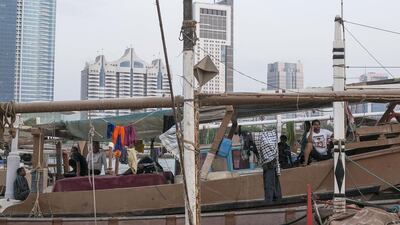Some lie barefoot on piles of fishing nets, their hands behind their heads as they look to the sky. Others huddle on the many dhows lined up along the port, their faces lit up by the mobile phone streaming the latest Bollywood film.
Whether they live on the fishing boats, or the nearby labour accommodation, the fishermen of Abu Dhabi’s Mina Zayed – and others who frequent the shisha cafes that line the way – have turned the small, concrete strip into a community.
With the weather beginning to cool, fishermen Danny, Vijay, Balvan, and Mono Bhai are getting ready for the start of the fishing season.
Their wages depend on what they bring back to shore, with the profits, after taking overheads into account, being split 50-50 between the fishermen and their Arab sponsor. Usually, the group will head out to sea for four days out of every two weeks. The rest of their time is spent relaxing, says Vijay.
“When we are at the port, we only sleep and eat. There is nothing much to do. We just chill,” says the 36-year-old, who has worked in the UAE for two years.
Choosing to live on the dhow, the group, all from the same village in the Indian state of Gujarat, also pass time watching films on their phones, or they go to nearby labour housing to watch TV.
Dhow after dhow, net after net, it is a similar view at the port – groups of men sitting in the front row of their own open-air cinemas.
But when films will not suffice, they have the next best thing on their doorstep.
“These tall, bright buildings across the Corniche fascinate us a lot,” says 25-year-old Danny, the youngest in the group.
“It looks like a Hollywood film set. We love to roam around these tall buildings.”
Compared to the bright and ever-changing lights of the opposing skyline, the port might not be as flashy, but it teems with life.
At 9pm, two fish market employees stroll into the main entrance, a large fish in each hand. Out back, two ginger cats sit patiently, watching workers move fish from one bucket to another. The men, smiling, toss one over.
Several hundred yards away, at Anchor Gents Salon, men sit back in their chairs as they wait their turn. Farther along the strip, past the restaurant boats that light up the water with their incandescent blue lights, and past the piles of wire fishing nets, Best Time Coffee Shop regulars smoke shisha. Some choose to partake in their shisha habit in a different manner. Parked by the edge of the port, a row of cars sit submerged in a cloud of smoke. Plastic chairs, each with a shisha placed carefully on top, sit either side of the car front doors, the pipes snaking into the barely open tinted windows.
It is a way of life that some of the port’s small community prefer to the city. “We don’t like life beyond the port. Those tall buildings never fascinate us. We are very happy in our comfort zone,” says Mukesh, also from Gujarat. “We are fishermen. The fisherman is like a fish who cannot survive without water and sea. We feel very peaceful here.”
When the men are not out at sea, which they estimate takes up half their year, they, too, watch movies on their phones, the group’s favourites being any film starring Salman Khan or Aishwarya Rai.
“The smartphone is a blessing. We watch films, play games and talk to our families,” says Naveen.
And though it can be a lonely way to make a living, away from their families, each fisherman is driven by the need to provide for his loved ones.
“Our ancestors belong to the same profession. Our fathers are doing the same fishing back home, but we came here because of money,” says Mukesh.
“Life is difficult here but money is our priority. We are here to give a comfortable living to our family back home.”
Mukesh’s team each sends back between 5,000 and 10,000 Indian rupees (Dh282 to Dh565) a month.
After their calls, and before they sleep, the men will eat, taking their pick of hammour, sherry or whatever else they find in their haul.
“What else do you expect from a fisherman? We eat fish and we sell fish,” says 40-year-old Balvan, who has worked in the UAE for eight years. “We cook by ourselves in a traditional Indian style. We don’t like Arabic-style cooked fish. It has no spices.”
As life begins to quieten down for the night, in preparation for the early morning starts when the boats come in and out of harbour, the men settle back into their makeshift seats.
“This is our home now,” says Danny. “We have lots of friends around with whom we chat for hours. For us, our boat is our palace.”
It is a sentiment shared by many others.
“Mina port is our home,” says Naveen.
“All of us are like a big, happy family. All of us live peacefully here regardless of our religious difference. We are only fishermen – not Hindu, Muslim or Christian.
“We have one faith, which is fishing.”
Zaineb Al Hassani is a senior news editor at The National.







